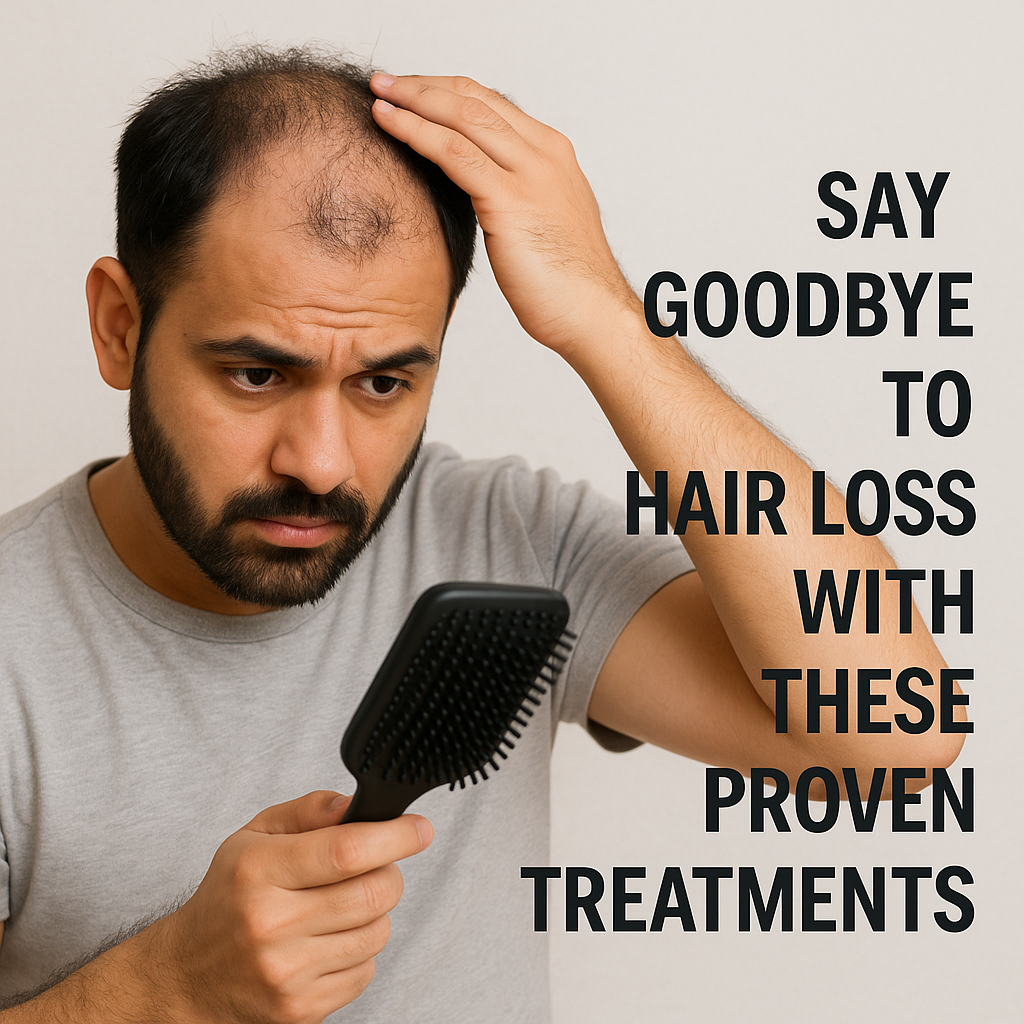Introduction
Hair loss is a common concern for many individuals, affecting both men and women. Whether it’s due to genetics, stress, or lifestyle factors, losing hair can be emotionally distressing. Fortunately, there are various proven treatments available that can help manage and even reverse hair loss. This guide will walk you through the best hair fall treatments that can help you restore your hair and regain your confidence.
Causes of Hair Loss
Understanding the causes of hair loss is the first step in addressing the issue. Hair loss can be triggered by several factors:
-
Genetics: Often the leading cause of hair loss, especially for men. Known as male-pattern baldness, this hereditary condition can begin as early as the teenage years.
-
Hormonal Changes: Pregnancy, menopause, or thyroid issues can cause hair thinning due to hormonal imbalances.
-
Stress: Emotional or physical stress can push your hair follicles into a resting phase, leading to hair fall.
-
Poor Nutrition: A lack of essential nutrients, such as iron, protein, and vitamins, can weaken hair, causing it to fall out.
Proven Hair Fall Treatments
Now that we understand the causes, let’s explore some effective treatments to tackle hair fall.
1. Topical Treatments
-
Minoxidil: This is a popular over-the-counter treatment used for both men and women. Minoxidil helps to stimulate hair growth by improving blood circulation to the scalp. Regular use can promote hair regrowth and slow down hair loss.
-
Caffeine Shampoos: Certain shampoos containing caffeine can stimulate the hair follicles and reduce hair loss. These shampoos help in strengthening hair and improving scalp health.
-
Herbal Treatments: Natural oils such as rosemary, peppermint, and castor oil have been known to improve hair health and promote growth. These oils are rich in nutrients that help nourish the scalp.
2. Oral Medications
-
Finasteride: For men suffering from hair loss, finasteride is often prescribed. This medication works by blocking the hormone that causes hair follicles to shrink, allowing for regrowth.
-
Iron and Vitamin Supplements: For individuals with hair loss due to nutritional deficiencies, iron, zinc, and biotin supplements can help strengthen the hair and prevent further shedding.
3. Hair Transplant Surgery
If other treatments don’t work, hair transplant surgery might be a suitable option. During the procedure, hair follicles from areas with thick hair are moved to the thinning or bald spots. This surgical method provides a permanent solution to hair loss.
4. Platelet-Rich Plasma (PRP) Therapy
PRP therapy is an innovative treatment that uses your blood’s platelets to promote hair regrowth. After drawing a small amount of your blood, the platelets are concentrated and injected into areas of the scalp experiencing hair loss. This stimulates the hair follicles and encourages new hair growth.
Preventing Hair Loss
While treatments can help restore lost hair, prevention is equally important. Here are some tips to maintain healthy hair:
-
Follow a Balanced Diet: Eating a diet rich in vitamins, proteins, and minerals is essential for healthy hair growth. Foods like eggs, spinach, and nuts can help nourish the hair from the inside.
-
Manage Stress: Practice stress-reducing techniques such as meditation, yoga, or deep-breathing exercises to help reduce hair loss triggered by stress.
-
Avoid Harsh Chemicals: Excessive use of hair dyes, straighteners, or chemical treatments can damage hair and lead to breakage. Try to use natural hair care products to keep your scalp and hair healthy.
-
Gentle Hair Care: Be gentle when washing or styling your hair. Avoid tight hairstyles that can cause hair breakage and traction alopecia.
Conclusion
Hair loss can be a frustrating experience, but there are several treatments available that can help combat the issue effectively. Whether you opt for topical treatments, oral medications, or even surgical procedures, it’s essential to consult with a healthcare provider to find the best solution for your needs. Additionally, adopting healthy hair care practices and managing stress can go a long way in preventing further hair loss. By following these steps, you can say goodbye to hair loss and enjoy healthy, strong hair once again.
FAQs
1. Q: What is the most effective treatment for hair loss?
A: The most effective treatment depends on the cause of your hair loss. For many, Minoxidil (a topical solution) works well, as it promotes blood circulation to the scalp and encourages hair regrowth. If hair loss is due to hormonal changes, Finasteride may be prescribed. For those looking for a permanent solution, Hair Transplant Surgery is a highly effective option.
2. Q: How long does it take to see results from hair fall treatments?
A: The results from hair fall treatments, especially with Minoxidil or PRP therapy, typically take a few months to become visible. Most users start seeing improvements in 3-6 months, but full results may take up to a year. It’s important to be consistent with treatment for the best outcomes.
3. Q: Can a poor diet cause hair loss?
A: Yes, a poor diet lacking in essential nutrients such as iron, zinc, and biotin can lead to hair thinning and loss. It’s crucial to eat a balanced diet with protein-rich foods, vegetables, and fruits to maintain healthy hair. Iron-rich foods, like spinach and red meat, are especially important for preventing hair loss due to iron deficiency.
4. Q: Is hair transplant surgery a permanent solution?
A: Yes, hair transplant surgery is a permanent solution for hair loss. The transplanted hair follicles are taken from areas resistant to hair loss (typically the back of the head) and moved to areas with thinning hair. These follicles typically continue to grow for a lifetime, providing a long-term solution.
5. Q: Are there any natural treatments for hair fall?
A: Yes, several natural treatments can help reduce hair loss. Rosemary oil and peppermint oil are known to improve scalp circulation, while castor oil is rich in nutrients that can nourish the hair and encourage growth. Regular scalp massages using these oils can improve blood flow and promote hair health.
Visit for more Informational Blogs.
